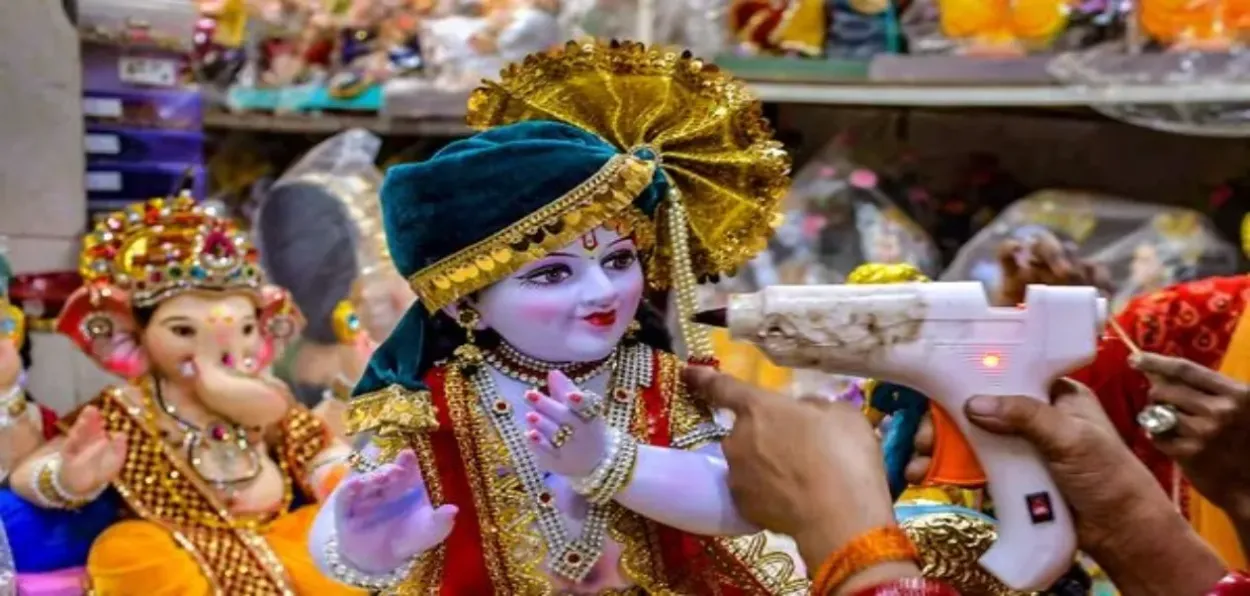
Syed Taleef Haider
Many Muslim writers adore Krishna. Poets have written eulogies of Lord Krishna in the Persian and Urdu languages. Lord Krishna has been acknowledged as a great figure in the history of Muslims in India for over a thousand years. The first mention of him in the Muslim literature is found in Kitab Al-Hind, the work of Al-Biruni. In his travelogue, he writes about discovering a very famous book called the Bhagavad Gita. He described the Gita as an authentic text and expressed his deep attachment to the teachings of Shri Krishna.
Similarly, renowned poets of Akbar’s court, Abul Fazl, and Faizi, were also Shri Krishna bhakts (devotees). Both brothers were accomplished Persian language poets and showed an affinity for the Indian religions. They translated the Bhagavad Gita from Sanskrit into Persian. Faizi, the elder brother, translated the Gita into verse and then Abul Fazl translated it into prose.
As the use of the Persian language in India began to decline and Urdu evolved as a language, Muslim poets started composing Qasidas (eulogies) for Krishna in Urdu. About two and a half centuries ago, Nazeer Akbarabadi expressed his devotion to the great figures of Hinduism by composing poems in Urdu. One of his compositions goes like this:
Har Aan Gopion ka yehi Mukh Bilaas hai
Dekho Baharen Aaj Kanhaiya ki Raas hai (There are gopis everywhere. Kanhiya is showing his ability to dance today).
Similarly, about 150 years ago, a well-known Urdu poet, Simaab Akbarabadi, wrote a poem titled ‘Shri Krishna” in which he described Krishna’s life, philosophy, wisdom, love, nobility, and his flute. He highlighted the charm and loftiness of Krishna’s thoughts. In his poem, he refers to Shri Krishna as the Prophet of India, saying:
Dilon me Rang Mohobbat ka Ustuvar Kiya
Sawad-e-Hind ko Geeta se Naghmma Bar Kiya (The heart is filled with colours of love; the Taste of India has blosommed with Bhagwad Gita's message)
He writes that Shri Krishna’s religion was one of love and peace. Aftab Rais Panipati recited a poem to show his devotion to Lord Shri Krishna. The wrote :
Aik Prem Pujari Aaya hai Charnon men Dhiyan Lagane ko
Baghwan Tumhari Murat pe Shradha ke Phool Chadane ko (A devotee has come to You. Oh Lord; to pay tributes to you and to show his love to You)
Throughout the poem, Rais Panipati expresses his devotion to Shri Krishna in various ways and seeks His blessings. In the final verse, he says:
Updesh Dharam ka de kar phhir Balwan Banado Bhagton ko
Ay Mohan Jald Zaban Kholo Geeta ke Raaz Batane ko (Give the sermon of Dharma and make your devotee strong; O Mohan, speak up and give us the secrets of Bhagwad Gita)
Shri Krishna and Bhagavad Gita are closely intertwined in the minds of Indian Muslims. This is why the Gita is often mentioned when Muslim poets remember Shri Krishna. A renowned poet of the 20th century, Charak Chinioti, also expressed his respect and admiration for Lord Krishna in his poems. His poem written in Chhoti Bahr (an element of Urdu and Persian poetry) became very popular in the Muslim world. In it, he described various attributes of Krishna and referred to him as an interpreter of life, the soul of the world, the master of life and death, and the lord of both worlds – the earth and heaven. He even refers to Krishna as his destiny and the melody of the world. He writes:
Meri Duniya Sanwar di uss ne
Meri Rooh-e-Rawan Hai mera Krishn (She shaped my life; Krishna is the charioter of my soul)
In the last part, he portrayed the love of Shri Krishna as the treasure of his afterlife. There are countless examples of Indian Muslim poets expressing similar devotion to Krishna. Among them, some evoke the feeling that even among non-Muslims, such as Muslims, there have been devotees of Krishna. For example, Mir Madhav, a renowned Persian poet, is a prominent figure in classical Persian poetry in India. Mir Madhav is popularly known as Krishna Bhagat. All historical records about him are related to his devotion to Krishna. He belonged to a Muslim family and worked for the government. Once, due to official duties, he had to attend a Krishna Kirtan, where Swami Bhuchitan was performing, singing songs of Krishna Bhakti.
Mir Madhav attended this gathering, got completely absorbed, and started chanting the name of Shri Krishna. Subsequently, his life took a dramatic turn. He left his government job, and his hometown, and began wandering in Gokul, Nandgaon, and Vrindavan. Inspired by his devotion, he wrote a Persian poem about Shri Krishna, which includes a verse:
Khud Shud Tamasha Gar Ayan Khud Shud Tamasha-e-Baraan
Khud Qafila Khud Karwn Sri Krishn Go Sri Krishn Go (The showman appeared an became the show, which is the cvaravan, said Sri Krishna, Say Shri Krishna)
ALSO READ: Bihar village where Muslims craft Lord Krishna's favourite flute
This poem became popular and was published by Gopilal Ji of Hyderabad. Mir Madhav passed away in Vrindavan while chanting Shri Krishna. Lala Babu is a Kayasth temple where he often visited and was revered by Hindus. His tomb lies close to the temple.
